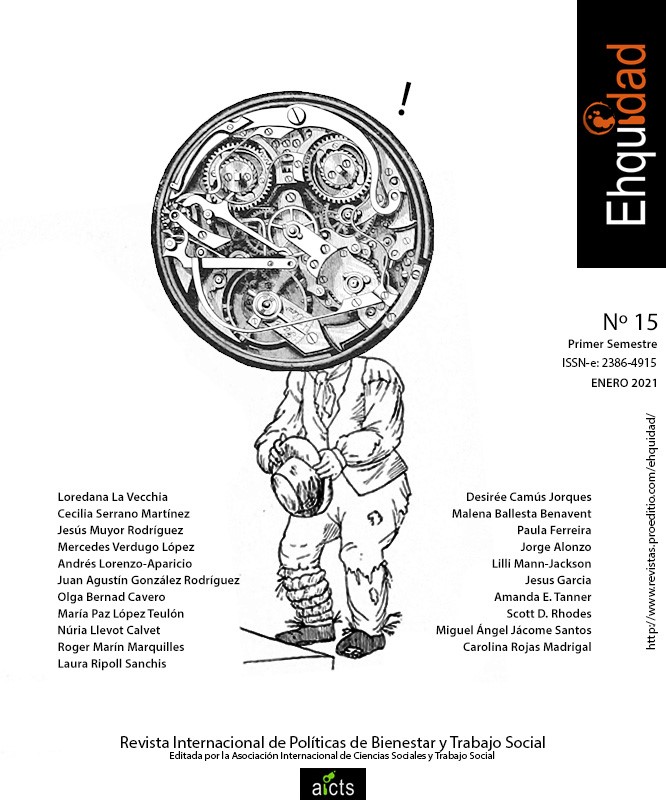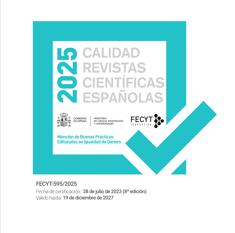The Potential of Modeling Process for Social Sciences and Social Work
DOI:
https://doi.org/10.15257/ehquidad.2021.0005Keywords:
models, modelization, complex systems, computational simulation, agent-based modellingAbstract
Simplification and necessary reductionism in a model cannot lead to detailed descriptions of social phenomena with all their complexity, but we can obtain useful knowledge from their application both in specific and generic contexts.
Human ecosystems, that perform as adaptative complex systems, have features which make it difficult to generate valid models. Amongst them, the emergency phenomena, that presents new characteristics that cannot be explained by the components of the system itself. But without this knowledge derived from modelling, we, as social workers, cannot suggest answers that ignore the structural causes of social problems.
Faced with this challenge we propose Agent Based Modelling, as it allows us to study the social processes of human ecosystems and in turn demonstrates new challenges of knowledge and competences that social workers might have.
Downloads
References
Anderson, J. G. (1987). Structural Equation Models in the Social and Behavioral Sciences: Model Building. Child Development, 58(1), 49.doi:10.2307/1130291
Amato, R. (2018). Human collective behavior models: language, cooperation and social conventions.
Amozurrutia, J. A. (2011). Complejidad y ciencias sociales: un modelo adaptativo para la investigación interdisciplinaria. Universidad Nacional Autónoma de México, Centro de Investigaciones Interdisciplinarias en Humanidades.
Armatte, M. (2006). La Noción de Modelo en las Ciencias Sociales. Empiria. Revista de metodología de ciencias sociales, 0(11), 33-70. doi:https://doi.org/10.5944/empiria.11.2006.1108
Ball, P. (2002). The physical modelling of society: a historical perspective. Physica A: Statistical Mechanics and its Applications, 314(1-4), 1-14.
Berrio, A. R. y De Mendicuti, E. S. (2012). Ensayo sobre la Epistemología del Trabajo Social y los modelos de intervención:¿ un nuevo significado para la construcción disciplinar del trabajo social?. In Epistemología, teoría y modelos de intervención en trabajo social: reflexión sobre la construcción disciplinar en España (pp. 81-98). Universidad de Deusto= Deustuko Unibertsitatea.
Bicchieri, C. (2005). The grammar of society: The nature and dynamics of social norms. Cambridge University Press.
Bicchieri, C. y Xiao, E. (2009), Do the right thing: but only if others do so. J. Behav. Decis. Making, 22: 191-208. doi:10.1002/bdm.621
Bourdieu, P. (1997). Razones prácticas. Sobre la teoría de la acción. Barcelona: Anagrama, 233.
Cardoso, C., Bert, F. y Podestá, G. (2011). Modelos Basados en Agentes (MBA): definición, alcances y limitaciones. Landuse, biofuels Rural Dev. La Plata Basin, 1-14.
Coleman, J. S. (1986). Social theory, social research, and a theory of action. American journal of Sociology, 91(6), 1309-1335.
CoMSES NET (2019). Computational Model Library. Recuperado 25 de julio de 2019, de https://www.comses.net/codebases/
Drogoul, A., Vanbergue, D. y Meurisse, T. (2002, Julio). Multi-agent based simulation: Where are the agents?. In International Workshop on Multi-Agent Systems and Agent-Based Simulation (1-15). Springer, Berlin, Heidelberg.
ESSA (2019). Essa@Work. Recuperado 25 julio 2019, de http://www.essa.eu.org/essawork/
FITS (2014). Definición Global del Trabajo Social.
Galán Ordax, J.M. (2007). Evaluación integradora de políticas de agua: modelado y simulación con sociedades artificiales de agentes (Tesis doctoral). Universidad de Burgos, Castilla y León.
García, R. (2006). Sistemas complejos. Barcelona: Gedisa, 202.
García-Valdecasas, J. I. (2016). Simulación basada en agentes. Introducción a Netlogo (Vol. 53). CIS-Centro de Investigaciones Sociológicas.
Gilbert, N. (2004). Agent-based social simulation: dealing with complexity. The Complex Systems Network of Excellence, 9(25), 1-14.
Gilbert, N. (2008). Agent-Based Models (Quantitative Applications in the Social Sciences) Sage Publications.
Gilbert, N. y Troitzsch, L.G. (1999) Simulation for the social scientist. Open University Press, Buckingham
GRASIA (2019). Research on Agent based, Social and Interdisiciplinary Applications. Recuperado 25 julio 2019, de http://grasia.fdi.ucm.es/
Helbing, D. y Balietti, S. (2011). From social simulation to integrative system design. The European Physical Journal Special Topics, 195(1), 69–100. doi:10.1140/epjst/e2011-01402-7
Henize, J. (1975). Toward a better understanding of social systems. Proceedings of the IEEE, 63(3), 380–390. doi:10.1109/proc.1975.9763
Hernández-Echegaray, A. (2019). Reflexiones acerca de las oportunidades y dificultades de la fundamentación teórica y metodológica en el Trabajo Social. Revista de Treball Social, 215, 13-31. DOI: 10.32061/RTS2019.215.13
Herrera Gómez, M. (2000). La relación social como categoría de las ciencias sociales. Reis, 37-77.
Holland, J.H. (1995) Hidden Order: How Adaptation Builds Complexity. New York: Helix Books (Addison Wesley).
Idareta Goldaracena, F. (2011). De Mary Richmond a Karl R. Popper y Emmanuel Lévinas: hacia la cientificidad y el conocimiento ético para el Trabajo Social. Cuadernos de Trabajo Social, 24, 85-99.
Izquierdo, L., Galán Ordax, J., Santos, J. y Del Olmo Martínez, R. (2008). Modelado de sistemas complejos mediante simulación basada en agentes y mediante dinámica de sistemas. Empiria. Revista de metodología de ciencias sociales, 0(16), 85-112. doi:https://doi.org/10.5944/empiria.16.2008.1391
Kisnerman, N. (1998). Pensar el trabajo social. Sites/Lumen.
Klimovsky, G. (1994). Las desventuras del conocimiento científico. AZ Editora. Buenos Aires.
Laboratorio de simulación social computacional (2016). Taller de simulación social. Recuperado 25 julio 2019, de http://www.ub.edu/tallersimulacionsocial/
Lorenzo-Aparicio, A., López Rodríguez, J.A. y Ballester Lledó, A. (2018). La simulación social computacional como herramienta de aprendizaje y teorización. Revista del Congrés Internacional de Docència Universitària i Innovació (CIDUI), 4.
LSDS (2019). Laboratorio de Simulación de Dinámicas Socio-Históricas. Recuperado 25 julio 2019, de http://sct.uab.cat/lsds/es
Morin, E. (1993). El Método: Naturaleza de la Naturaleza, Tomo I, Ed. Cátedra, Madrid.
Nowak, A., Rychwalska, A. y Borkowski, W. (2013). Why simulate? to develop a mental model. Journal of artificial societies and social simulation, 16(3), 12. DOI: 10.18564/jasss.2235
Perez, P. y Batten, D. (2006). Complex science for a complex world: an introduction. In P. Perez & D. Batten (Eds.), Complex Science for a Complex World: Exploring Human Ecosystems with Agents (3-19). Canberra, Australia: ANU E Press.
Pinto Ferreira, L. y Uribe Villegas, O. (1959). Concepto y Clasificación de los Procesos Sociales. Revista Mexicana de Sociología, 21(2), 485.doi:10.2307/3538182
Ritzer, G. (1993). Teoría sociológica contemporánea. Ed. MacGrawHill, Madrid.
Rodríguez Zoya, L.G. y Roggero, P. (2014). La modelización y simulación computacional como metodología de investigación social. Polis (Santiago), 13(39), 417-440.
Rodríguez Zoya, L.G. y Roggero, P. (2015). Modelos basados en agentes: aportes epistemológicos y teóricos para la investigación social. Revista mexicana de ciencias políticas y sociales, 60(225), 227-261. Recuperado en 25 de julio de 2019, de http://www.scielo.org.mx/scielo.php?script=sci_arttext&pid=S0185-19182015000300227&lng=es&tlng=es.
Torres Carrillo, A. y Jiménez Becerra, A. (2004). La construcción del objeto y los referentes teóricos en la investigación social. La práctica investigativa en ciencias sociales, 13.
Winner, L. (1980). Do artifacts have politics?. Daedalus, 121-136.












